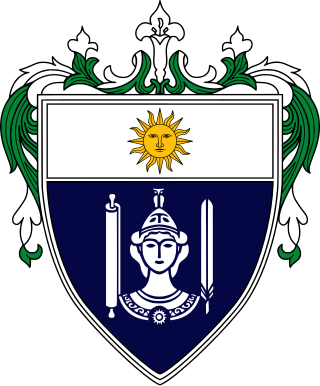
The University Athletic Association of the Philippines (UAAP), established in 1938, is an athletic association of eight Metro Manila universities in the Philippines. The eight-member schools are Adamson University (AdU), Ateneo de Manila University, De La Salle University (DLSU), Far Eastern University (FEU), National University (NU), University of the East (UE), University of the Philippines Diliman (UP), and the University of Santo Tomas (UST).

Ateneo de Manila University, commonly referred to as Ateneo de Manila or Ateneo, is a private, Catholic, teaching and research university, and a basic education institution located in Quezon City, Philippines. Established in 1859 by the Jesuits, it is among the oldest Jesuit-administered institutions of higher education in the Asia-Pacific.

San Beda University is a private Catholic coeducational basic and higher education institution run by the Order of Saint Benedict in San Miguel, Manila, Philippines. It was founded by the Benedictines in 1901. The main campus is situated in Mendiola, San Miguel, Manila and provides tertiary education. It has a satellite campus that provides elementary and high school education in Taytay, Rizal.

The National Collegiate Athletic Association is an athletic association of ten private colleges and universities in Metro Manila, Philippines. Established in 1924, it is the oldest collegiate athletic association in the country. The Philippine NCAA is not affiliated with the NCAA of the United States.
The Women's National Collegiate Athletic Association (WNCAA) is an athletic association in the Philippines exclusively for women. It was founded in 1970. Competition is divided into three divisions: Seniors for college students, Juniors for high school students, and Midgets for grade school and first year high school students. Its men's counterpart is the Men's National Collegiate Athletic Association, founded in 2004.
The Home and Away Invitational League was an intercollegiate basketball and volleyball league in the Philippines formed in 2004. It was administered by a group led by Far Eastern University athletic heads Anton Montinola and Mark Molina.

Bienvenido Florendo Nebres,S.J. is a Filipino scientist, mathematician, and a Jesuit priest who was the longest-serving university president of the Ateneo de Manila University. He succeeded Joaquin G. Bernas in 1993 and served as University President until 1 June 2011. He currently sits as a member of the board of trustees of Georgetown University, Regis University, St. Edward School Foundation, Inc., the Asian Institute of Management, and other colleges and universities in the Philippines. He is also a member of the board of directors of Philippine Long Distance Telephone Company, and is currently chairman of the Synergeia Foundation. He was also Provincial Superior of the Society of Jesus in the Philippines.

The University Belt is a de facto subdistrict in Manila, Philippines, referring to an area with a significant concentration of major colleges and universities in the city. The districts of Quiapo, Sampaloc, and San Miguel are traditionally considered part of the University Belt. Other clusters of schools along the southern bank of the Pasig River, mostly in the districts of Intramuros and Ermita and the southernmost part of Malate near the city limits, are also sometimes included. Each of the colleges and universities in the district is within walking distance of each other.

The University of Santo Tomas Faculty of Civil Law or "UST Law" is a law school in Manila, Philippines. It is administered under the jurisdiction of the University of Santo Tomas, the oldest existing university in the Asia. It is one of the three law schools of the University of Santo Tomas in Manila, with the other two being the Faculty of Canon Law and the Graduate School of Law.
Legal education in the Philippines is developed and offered by Philippine law schools, supervised by the Legal Education Board. Previously, the Commission on Higher Education supervises the legal education in the Philippines but was replaced by the Legal Education Board since 1993 after the enactment of Republic Act No. 7662 or the Legal Education Reform Act of 1993.

The University of Santo Tomas Faculty of Arts and Letters, popularly known as "UST Artlets" or "UST AB", is the liberal arts school of the University of Santo Tomas, the oldest and the largest Catholic university in Manila, Philippines.

The Nike Summer League is a defunct pre-season collegiate basketball tournament in the Philippines sponsored by Nike. Its first season started in 2006. The tournament was last held in 2009. Games were telecast on TV by Studio 23.

The Central Colleges of the Philippines, Inc., also referred to by its acronym CCP, is a private, nonsectarian coeducational higher education institution located in Quezon City, Metro Manila, Philippines. CCP was established on January 18, 1954, as the Polytechnic Colleges of the Philippines, Inc. (PCP), with an enrollment of 300 students.
A college of arts and sciences or school of arts and sciences is most commonly an individual institution or a unit within a university that focuses on instruction of the liberal arts and pure sciences, although they frequently include programs and faculty in fine arts, social sciences, and other disciplines such as humanities. They are especially found in North America and the Philippines.

Francisco "Soc" Aldana Rodrigo was a Filipino playwright, lawyer, broadcaster, and a Senator of the Philippines from 1955 to 1967.
Higher education in the Philippines is offered through various degree programs by colleges and universities—also known as higher education institutions (HEIs). These HEIs are administered and regulated by the Commission on Higher Education (CHED).
Bar topnotchers in the Philippines are bar examinees who garnered the highest bar exam grades in a particular year. Every year, the Supreme Court releases the bar top ten list. The list contains the names of bar examinees who obtained the ten highest grades. It is possible for more than ten examinees to place in the top ten because numerical ties in the computation of grades usually occur.











